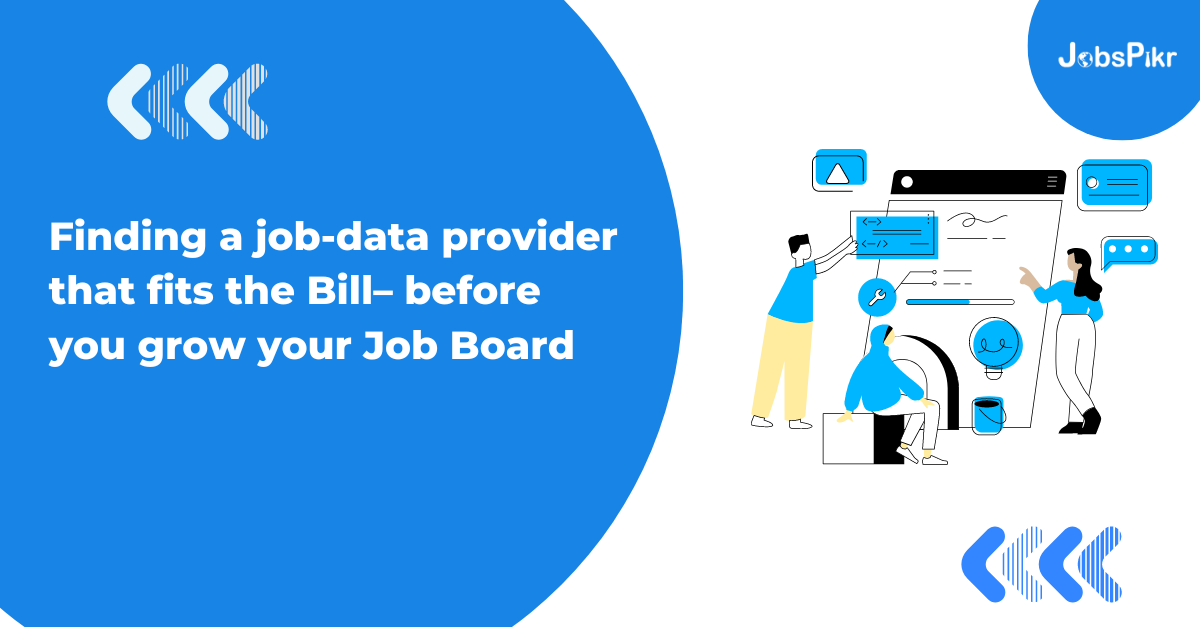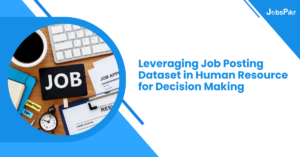The advent of the internet and data science has helped the job industry to grow sans geographical boundaries. Today someone sitting in Australia can apply for a job in Greenland– thanks to different job sites. However, such a scenario has also resulted in millions of job posts being added every day. Those wanting to host the data, create a product on top of the massive dataset and create usable tools for end customers, (companies or job applicants) need to first go through a maze of job data providers before taking the plunge.
Some of the important factors to consider when you are evaluating job data Provider are:

Accuracy and Quality of Data-
No matter what your end goal is– creating a job matching data tool, setting up a job board, or offering job consultancy to applicants, the accuracy of job data would play the biggest role in your success or failure. An easy way to validate this would be to get some webpages scraped from different websites and sources that you need data from. Validating your hypothesis on a smaller subset of data would enable you to understand which service provider would suit your requirements better.
In case you have the need to scrape complex websites in the future, you should check whether the service supports scraping data from websites that render content on the fly. There are two major metrics that you can monitor for accuracy–
a. Whether all the data points could be captured from different websites.
b. The amount of garbage data in the data points captured.
Coverage and filters–
Some job boards may want to target a niche industry such as technology and services. Others may focus on a specific region. But no matter who your target audience is now, expansion plans at any point would require you to update your filters and get data from more sources. Hence, when looking at different service providers, you need to see whether they cover most of the major job markets, popular industries, and all types of positions that are common for those industries. The higher the coverage, the better chances of you being able to expand your job board later, or change the focus area.
Filters, customizations, and flexibility-
Some job feed services are offered to customers ‘as-it-is’. However, most jobs feed consumers require personalized customizations so that the data fits the end requirement best – users only see the jobs relevant to them. Such customizability can be in terms of custom filters that can be changed or adjusted on the fly. Changes such as –
- Scraping new data points from job posts,
- Adding new sources of data and
- Changing the frequency of the data update
may be required at any point in time. A highly customizable service would enable you to continue your primary offering (a service that you build on top of the job data) without having to worry about changes and updates.
Data formats, storage, and integration options-
No two computing systems are built alike. You may need data in the form of CSV sheets, JSONs, XMLs, or maybe even graph data. The data may need to be stored in cloud storage services like AWS S3 or Azure Blob. In case you want to access the data based on real-time queries, you may also prefer an API-based integration.
Services that offer more flexibility and custom integration options are likely to be more beneficial to you since that would enable you to add job data to your existing workflow with minimal changes. Having to change your current system so that you can consume data from the job data provider would be a waste of resources and time. Also, such an inelastic system may cause you trouble later on when your needs evolve – like upgrades or changing your system. This may require modifications in the job-data source side as well.
Scalability and maintenance-
You may begin a job board with 10 sources, 2 countries, and 5 industries. However, your requirements can change where you may need to add more sources to reach a wider audience and shore up your revenue. Your data requirements can grow from MBs per hour to Gbs per hour in a very short period. On the other side of the coin, as your job board grows, you may be catering to thousands or even millions. In that case, even a downtime of a few hours may significantly hit your monthly revenue.
Hence you have to ensure that whichever job data service you choose can scale its systems quickly as you grow and also takes care of all maintenance activities. Systems may stop working for a short period if the source website changes its UI or updates the tech stack on which it is built. Nevertheless, the best job feed services would have backup sources in such cases as well as built-in alarms which gets triggered so that a patch can be pushed in quickly and data can start flowing in again at the soonest.
SLAs and Support-
No matter how good a service claims to be, if you do not have strong SLAs backing you, you may be in trouble when things spiral down. You also need to understand the level of support that you will be provided with, both in terms of initial setup and training as well as ongoing help whenever required. The turnaround time for small and major incidents must be discussed beforehand so that you can keep your business stakeholders apprised.
Legal and Compliance Fit-
When consuming any Job Data Provided by a service provider, you need to ensure that the data was procured legally. Unless your data provider is compliant with the laws of the land, you may be held liable in case of a lawsuit. The latest data protection laws such as GDPR and CCPA are complex and put the onus on the entity that uses the data for commercial gain. If your data is procured without following due diligence, the repercussions may be so high that the future of your job board itself may be at stake.
Previous Customers and Case Studies-
Unless your job data provider has already served different companies and has good experience in enabling different data products, opting for them may not yield the right results since you would not have a history to bank upon.
Our DaaS offering JobsPikr enables companies to discover global job trends using a live job feed. Over 200 companies rely on our job data to build services and for market research. We provide-
- Data with industrial classification
- Both live and historical data
- Intuitive Dashboards
- Easy-to-use interface
- Customizable and adaptive system
With over 70 data sources under our belt, we extract 45 unique data points and provide seamless integration within an hour. Our Job Data Provider powers services like labor market analysis, skill gap surveys, job matching algorithms, designing new coursework, salary benchmarking, and talent intelligence.
To know more about JobsPikr, get in touch with us at sales@jobspikr.com




